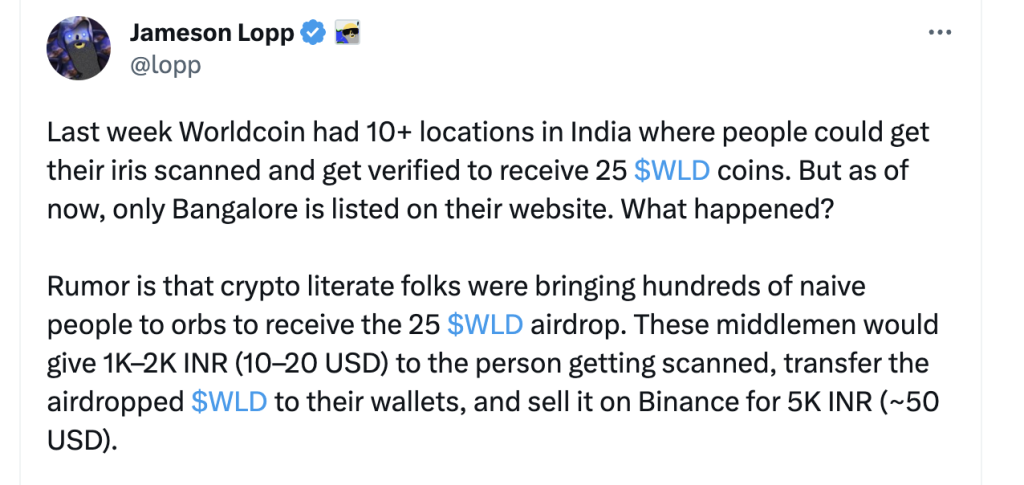
Worldcoin’s initiative to distribute its $WLD coins in India has sparked a heated debate. The crypto project has been inviting individuals to get their irises scanned as part of a unique verification process in exchange for 25 $WLD coins.
Until recently, over ten locations in India participated in this program. Currently, only Bangalore remains actively listed on their website, triggering speculation and diverse interpretations within the crypto community.
Some observers point out that savvy crypto users were exploiting this system to their advantage. They were said to be bringing in large numbers of people less knowledgeable about cryptocurrencies, paying them a small amount (around 1K–2K INR or 10–20 USD), and then receiving the airdropped $WLD on their behalf. These middlemen would then sell the airdropped tokens on Binance for approximately 5K INR, roughly 50 USD.

Certain individuals in the crypto sphere see this situation as a form of real-world maximum extractable value (MEV), likening it to “bonus bagging”. In this strategy, someone signs up a friend on a sports betting site, takes advantage of the site’s bonus system, and repeats the process with other friends and sites.
Others, while critical of the exploitation, see the situation as an “in real life” arbitrage, highlighting the clever yet arguably unethical exploitation of the system for profit.
Despite the controversy, some in the community believe that these developments might not be problematic for Worldcoin itself. The primary goal of the project seems to be to scan as many irises as possible, while the distribution of the tokens could be seen as an incentive rather than an end goal.
However, this event has also reignited discussions on the fairness and feasibility of cryptocurrency distributions, with some arguing that it’s impossible to improve upon the perceived imperfect fairness of Bitcoin’s distribution.
Meanwhile, some speculate that the next step could involve hacking the scanning process itself, using artificial eyes or contact lenses. This is yet another angle that Worldcoin and similar initiatives will have to consider as they move forward.
Worldcoin has developed an iris recognition system using orb scanning technology to create unique digital identities for users globally. The system has already scanned over 2 million eyeballs, though expansion plans were temporarily suspended in Kenya over privacy concerns. Worldcoin aims to sign up more users worldwide and allow other organizations to utilize its biometric identity system for purposes like financial transactions and voting. However, privacy and data protection remain key concerns surrounding the iris scanning crypto project.






